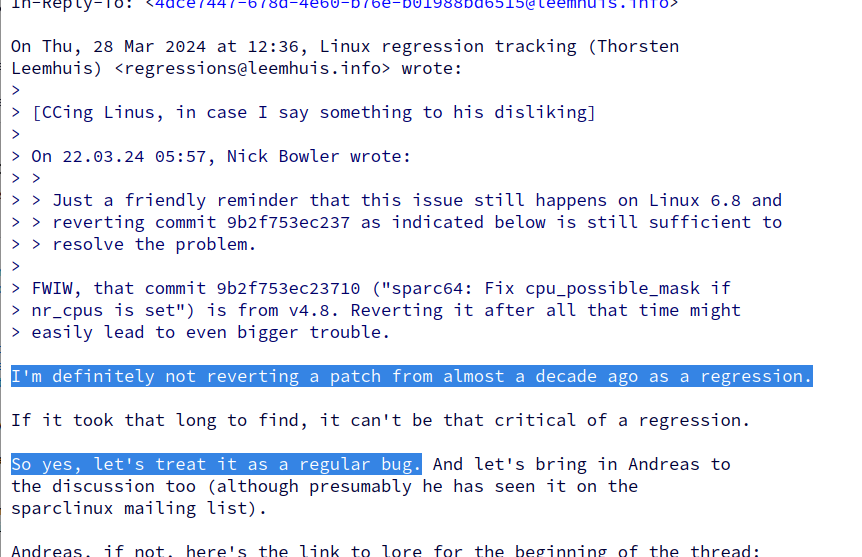Thorsten Leemhuis (acct. 1/4)
kernellogger@fosstodon.org#Linux regressions only reported after a long time[1] will be handled as bugs (IOW: the "no regressions" rule does not really apply any more), as this recent mail from Linus shows:
https://lore.kernel.org/all/CAHk-%3DwgFuoHpMk_Z_R3qMXVDgq0N1592%2BbABkyGjwwSL4zBtHA@mail.gmail.com/
[1] How long? Not sure, in the end that's up to Linus. But from an earlier mail of him I guess it everything found after more that a year might become problematic:
https://lore.kernel.org/all/CAHk-=wis_qQy4oDNynNKi5b7Qhosmxtoj1jxo5wmB6SRUwQUBQ@mail.gmail.com/
Thorsten Leemhuis (acct. 1/4)
kernellogger@fosstodon.orgKrzysztof Kozlowski
krzkI personally follow exactly the same approach in handling fixes: if something was broken for long time, it is regular bugfix thus goes to "for-next" branch, not "fixes / for-linus / for-current-rc".
Now, if a regression was unnoticed for 8 years, it kinda fits above criteria.
Thorsten Leemhuis (acct. 1/4)
kernellogger@fosstodon.orgyeah, I'm aware of it; but I think I'd classify them in three different categories:
* recent regressions (~past year): devs are obliged to fix, ideally through fixes/for-linus/for-current-rc
* older regression (~one to two or three years?): devs are obliged to fix, ideally in the next merge window if timing permits
* anything older: treat it like any other bug
Thorsten Leemhuis (acct. 1/4)
kernellogger@fosstodon.organd wrt. to stable:
the "# after X weeks in mainline" (X=4 or 6 or something) option could reduce the pain[1], but that is bound to the stable tag; and we lack a "nostable" tag, too[2]. 🥴
[1] https://docs.kernel.org/process/stable-kernel-rules.html
[EDIT]
[2] maybe we could introduce
Cc: <stable@vger.kernel.org> #exclude
or something like that to make "do not backport" obvious
[/EDIT]
Krzysztof Kozlowski
krzkKrzysztof Kozlowski
krzkThorsten Leemhuis (acct. 1/4)
kernellogger@fosstodon.orgThose "no-stable" subsystems are listed here:
